Stress is something that everyone experiences at some point in their lives. Whether it’s due to work, school, or personal issues, stress can affect your mind and body. Imagine if you could manage stress without relying on medication, simply by adjusting what you eat. Intrigued? While there are many ways to manage stress, one of the healthiest and most natural methods is through diet. You might be skeptical—can food make that much of a difference?
The answer is yes, and it’s backed by science. Certain stress relief foods have been shown to reduce stress hormones and improve overall well-being. In this blog, we will explore the top 10 foods that reduce stress hormones, specifically cortisol, and provide you with practical tips on how to incorporate them into your diet. Not only are these foods effective, but they are also accessible, affordable, and easy to integrate into your busy lifestyle. By making simple changes to what you eat, you can manage stress more effectively and live a healthier, happier life. Ready to find out how? Let’s dive in! For more information on managing stress holistically, you can check out our Holistic Stress Management blog.
The Role of Diet in Stress Management
Diet plays a crucial role in how our bodies handle stress. When we’re stressed, our bodies produce a hormone called cortisol. While cortisol is essential for responding to stressful situations, too much of it can lead to negative effects on your health, such as anxiety, depression, and even physical issues like high blood pressure. Learn more about stress and its effects by watching our video What Is Stress?
Certain foods contain nutrients that help to lower cortisol levels, making them excellent cortisol-reducing foods. For example, foods rich in magnesium, vitamin C, omega-3 fatty acids, and antioxidants can all help reduce stress. Eating a balanced diet with these nutrients not only helps manage stress but also supports overall mental, physical, and emotional health. For strategies on managing stress at work, visit our blog on How to Deal with Stress at Work.
Top 10 Stress Relief Foods
1. Herbal Teas (Other than Chamomile)
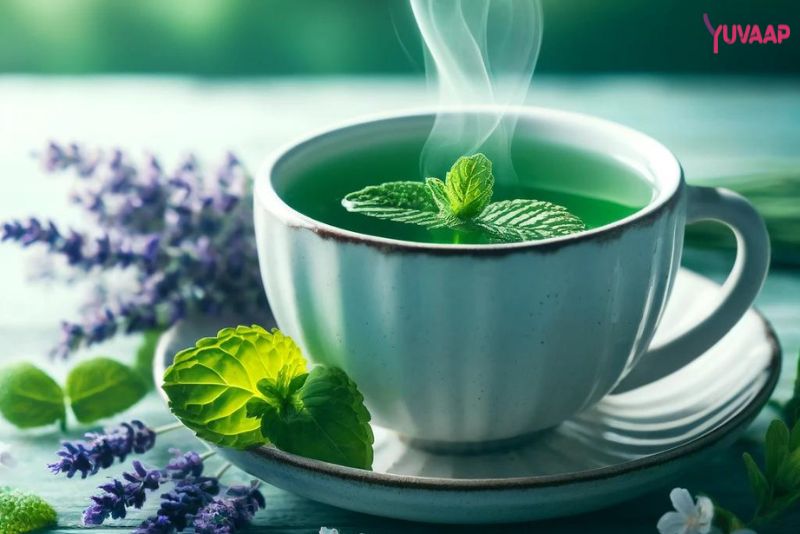
Various herbal teas, such as peppermint, lavender, and lemon balm, have calming effects that can help reduce stress and promote relaxation. These teas contain compounds that soothe the nervous system and improve mood. Scientific evidence supports the benefits of these teas in managing stress and enhancing well-being. Drinking herbal teas can be a simple and effective way to incorporate stress-relief food into your daily routine.
How to Incorporate:
- Enjoy a cup of peppermint tea after meals to aid digestion and reduce stress.
- Drink lavender tea in the evening to help unwind and prepare for a good night’s sleep.
- Savor a cup of lemon balm tea during the day to stay calm and focused.
Incorporating these foods that reduce stress hormones into your diet can significantly improve your ability to manage stress.
2. Avocado

Avocados are rich in healthy fats, vitamins, and minerals that are essential for reducing stress and improving overall health. They contain high levels of potassium, which helps lower blood pressure, and vitamin B, which is crucial for maintaining healthy nerve and brain cells. The healthy fats in avocados, especially omega-3 fatty acids, play a significant role in lowering cortisol levels and reducing inflammation. Research supports the benefits of these nutrients in stress management.
How to Incorporate:
- Add sliced avocado to your salads and sandwiches for a nutritious boost.
- Blend avocado into smoothies for a creamy texture and added health benefits.
- Make guacamole as a tasty and healthy dip for vegetables or whole-grain crackers.
3. Blueberries

Blueberries are packed with antioxidants and vitamins that help combat stress and improve overall health. These small berries are rich in vitamin C and other antioxidants that help reduce the damage caused by stress. Studies indicate that eating blueberries can help lower cortisol levels and protect your body from the harmful effects of stress.
How to Incorporate:
- Snack on a handful of fresh blueberries as a quick and healthy treat.
- Add blueberries to your morning cereal, yogurt, or oatmeal.
- Blend blueberries into smoothies for a refreshing and nutritious drink.
4. Chamomile Tea

According to research “Chamomile: A herbal medicine of the past with bright future” conducted by PubMed, Chamomile tea is renowned for its calming effects on the mind and body. This herbal tea contains antioxidants that help reduce inflammation and anxiety. Chamomile has been used for centuries as a natural remedy to promote relaxation and improve sleep quality, making it an excellent stress relief food. Scientific studies have shown that chamomile can help lower cortisol levels and alleviate symptoms of anxiety and depression.
How to Incorporate:
- Enjoy a warm cup of chamomile tea before bedtime to help relax and unwind.
- Add a slice of lemon or a teaspoon of honey for added flavor and health benefits.
- Drink chamomile tea during the day as a caffeine-free alternative to coffee.
5. Green Leafy Vegetables
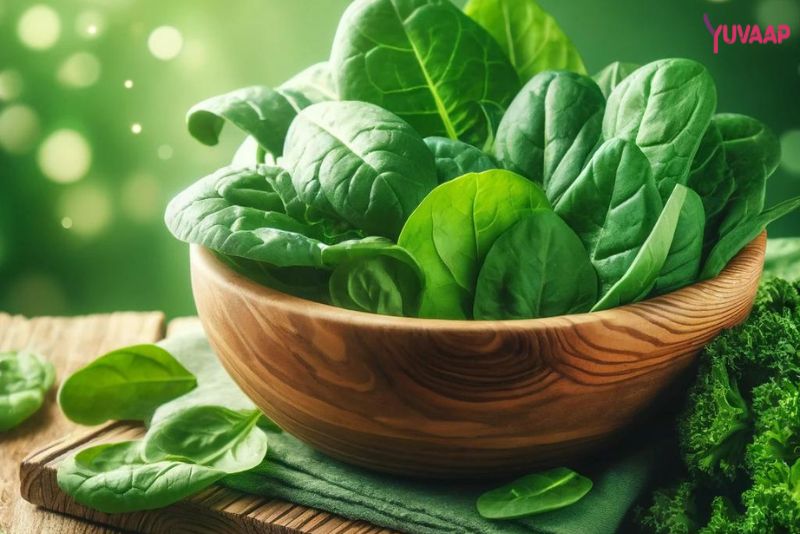
Green leafy vegetables like spinach, kale, and Swiss chard are packed with essential nutrients that help reduce stress and improve overall health. These vegetables are rich in magnesium, a mineral that plays a crucial role in regulating cortisol levels and promoting relaxation. Additionally, they contain vitamins and antioxidants that support brain health and reduce inflammation. Incorporating these greens into your diet can have a profound impact on your mental and physical well-being.
How to Incorporate:
- Add a handful of spinach or kale to your smoothies for a nutrient boost.
- Include green leafy vegetables in your salads, stir-fries, and soups.
- Steam or sauté greens as a side dish to accompany your main meals.
6. Nuts and Seeds
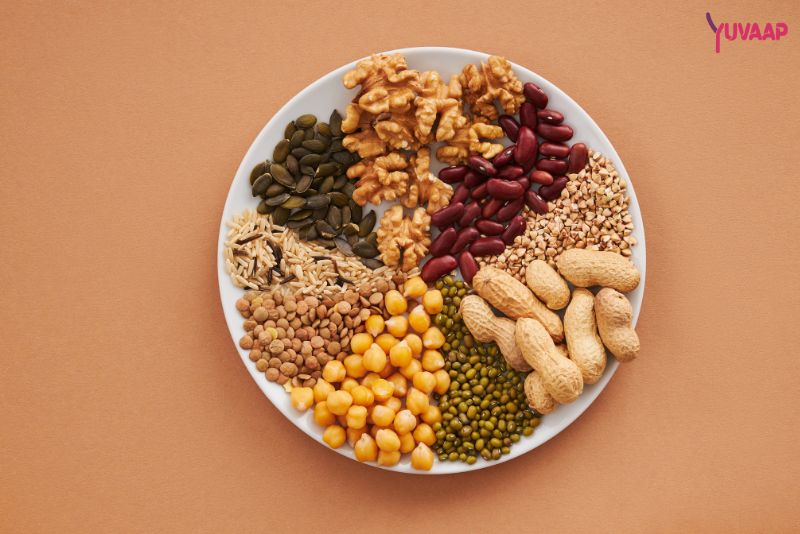
Nuts and seeds are excellent sources of healthy fats, protein, and fiber, which help stabilize blood sugar levels and reduce stress. They are rich in magnesium and omega-3 fatty acids, both of which are essential for lowering cortisol levels and improving mood. Including a variety of nuts and seeds in your diet can provide a significant boost to your mental and physical well-being.
How to Incorporate:
- Snack on a handful of almonds, walnuts, or sunflower seeds during the day.
- Add nuts and seeds to your yogurt, oatmeal, or salads for added crunch and nutrition.
- Use nut butter, like almond or peanut butter, as a spread on whole-grain toast or as a dip for fruits and vegetables.
7. Turmeric
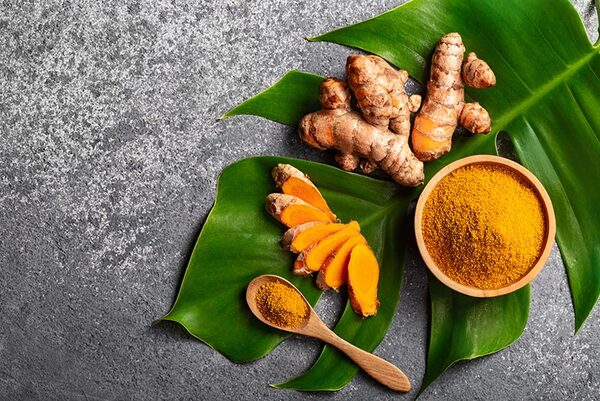
As per studies, Turmeric, a golden-yellow spice commonly used in Indian cuisine, is known for its powerful anti-inflammatory and antioxidant properties. The active compound in turmeric, curcumin, has been scientifically shown to reduce cortisol levels and help manage stress. Turmeric also supports brain health and improves mood by increasing the production of serotonin and dopamine, making it an excellent stress-relief food.
How to Incorporate:
- Add turmeric to your curries, soups, and stews for a flavorful boost.
- Make a soothing turmeric latte by mixing turmeric with warm milk and a dash of honey.
- Sprinkle turmeric on roasted vegetables or rice dishes for added color and health benefits..
8. Yogurt
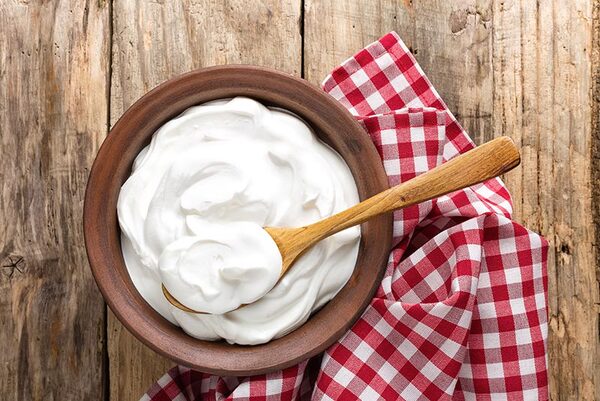
Yogurt is rich in probiotics, which are beneficial bacteria that support gut health. A healthy gut is essential for overall well-being and can significantly impact your mood and stress levels. Scientific studies have shown that probiotics can help reduce symptoms of anxiety and depression by improving the gut-brain connection. Including yogurt in your diet can help lower cortisol levels and promote relaxation.
How to Incorporate:
- Enjoy a bowl of yogurt with fresh fruit and nuts for a nutritious breakfast or snack.
- Use yogurt as a base for smoothies to add creaminess and probiotic benefits.
- Make a healthy dip by mixing yogurt with herbs and spices to enjoy with vegetables or whole-grain crackers.
9. Oranges
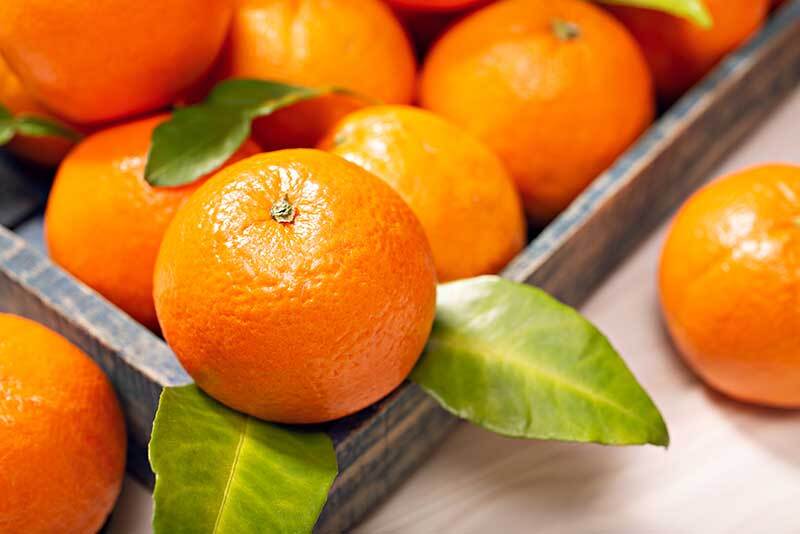
Oranges are packed with vitamin C, which plays a crucial role in reducing stress and supporting overall health said PubMed. Vitamin C helps lower cortisol levels and strengthens the immune system, making it easier for your body to cope with stress. Eating oranges can provide a refreshing and natural way to boost your mood and energy levels, contributing to holistic wellness.
How to Incorporate:
- Snack on a fresh orange or drink a glass of freshly squeezed orange juice.
- Add orange segments to your salads for a burst of flavor and nutrition.
- Use orange zest and juice in baking or cooking to enhance the taste of your dishes.
10. Dark Chocolate
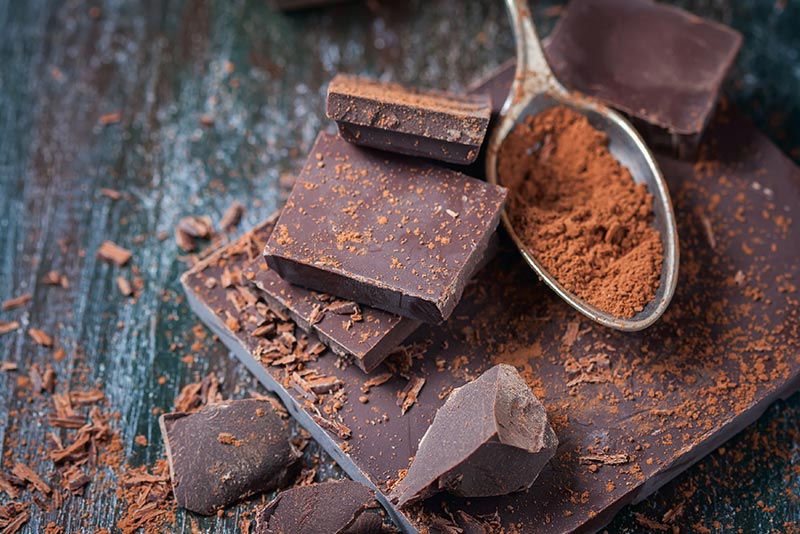
Dark chocolate is not only a delicious treat but also a powerful stress relief food. It contains compounds that help improve your mood and reduce stress. One of these compounds is flavonoids, which have antioxidant properties that help lower blood pressure and improve blood flow to the brain, enhancing your mood and cognitive function. Scientific studies have shown that dark chocolate can help lower cortisol levels, making it one of the best cortisol-reducing foods.
How to Incorporate:
- Enjoy a small piece of dark chocolate (70% cocoa or higher) as a daily treat.
- Add dark chocolate chips to your yogurt or oatmeal for a healthy and delicious breakfast.
- Use dark chocolate in baking recipes for a stress-relieving dessert.
How to Incorporate Stress Relief Foods into Your Diet
Incorporating stress-relief food into your diet doesn’t have to be difficult or time-consuming. Here are some practical tips to help you add these beneficial foods to your daily meals:
Start Your Day with a Nutrient-Packed Breakfast:
- Make a smoothie with spinach, avocado, yogurt, and blueberries. Add a sprinkle of flax seeds for extra nutrients.
- Enjoy a bowl of oatmeal topped with nuts, seeds, and a few pieces of dark chocolate for a delicious and stress-relieving start to your day.
Incorporate Stress-Relieving Snacks:
- Keep a handful of nuts and seeds on hand for a quick and healthy snack.
- Snack on fresh fruits like oranges or make a fruit salad with blueberries and a dollop of yogurt.
Enhance Your Lunch and Dinner:
- Add a side salad with plenty of green leafy vegetables to your meals. Top it with avocado and a light vinaigrette.
- Include a serving of turmeric-spiced dishes, such as curry or turmeric-roasted vegetables.
- Use yogurt as a base for healthy dressings or dips to accompany your meals.
Enjoy Relaxing Beverages:
- Drink chamomile or other herbal teas like peppermint, lavender, or lemon balm throughout the day to stay calm and hydrated. For more relaxation techniques, read our blog on Best Relaxation Techniques to Manage Stress.
- Replace sugary drinks with freshly squeezed orange juice or a soothing turmeric latte.
Healthy Dessert Options:
- Treat yourself to a small piece of dark chocolate after dinner.
- Make a yogurt parfait with layers of yogurt, blueberries, and a drizzle of honey for a satisfying and stress-relieving dessert.
Plan and Prepare:
- Plan your meals and snacks ahead of time to ensure you always have stress-relieving foods available.
- Prepare large batches of dishes like turmeric spiced soups or green leafy vegetable salads to save time during busy days.
By incorporating these foods that reduce stress hormones into your diet, you can create meals that not only nourish your body but also help manage stress. Focus on using organic, whole, and minimally processed foods to maximize the health benefits. These simple dietary changes can support your mental, physical, and emotional well-being, contributing to a holistic approach to health.
Stress is a common part of life, but managing it effectively is crucial for maintaining overall health and well-being. By incorporating stress-relief food into your diet, you can naturally reduce stress hormones like cortisol and improve your mood and energy levels. Foods such as dark chocolate, avocado, blueberries, chamomile tea, green leafy vegetables, nuts and seeds, turmeric, yogurt, oranges, and herbal teas offer powerful benefits for reducing stress and supporting holistic wellness. For more information on how food can impact brain health, watch our video on Foods for Brain Health.
Remember, achieving a balanced and stress-free life involves more than just diet. Incorporating practices such as yoga, meditation, and regular exercise, along with a commitment to chemical-free living, can further enhance your ability to manage stress. These activities, combined with a diet rich in foods that reduce stress hormones, create a comprehensive approach to wellness that addresses your physical, mental, and emotional health. For additional support on managing mental health, check out our video on How To Come Out Of Depression.
You have the power to take control of your stress levels and improve your overall quality of life. Start by making small, manageable changes to your diet and lifestyle. Embrace the journey towards holistic wellness, and experience the positive impact these changes can bring to your life.
References
https://www.ncbi.nlm.nih.gov/pmc/articles/PMC5409678
https://www.ncbi.nlm.nih.gov/pmc/articles/PMC5664031/
https://www.ncbi.nlm.nih.gov/pmc/articles/PMC2995283/

Priyanka Khurana Goyal is a prominent Indian figure renowned for her diverse accomplishments and contributions across various fields.. Read more


